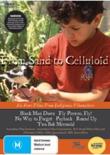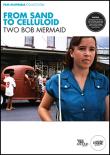
 5653062152109028258.jpg
5653062152109028258.jpg
Latest Issues
AbstractHistoryArchive Description
An initiative of the Indigenous Branch of the Australian Film Commission (AFC), From Sand to Celluloid comprises six films that have been packaged and distributed by Australian Film Institute Distribution (AFID) and Film Australia. The initial conception for the series came from the Indigenous Drama Initiative, set in 1994 with the express intention of advancing the development and production of films created by Indigenous Australians and increasing their participation in all areas of the film and television industry. The first project initiated was the development and production of six ten-minute dramas for television. Expressions of interest were called for from Indigenous Australians nationally. The ten applicants chosen (from forty seven) attended a visual storytelling workshop held in Melbourne in 1995. The Initiative utilised the assistance of all the state film assistance agencies and a pre-sale from SBS with an agreement to broadcast on SBS in July 1996, as well as the full participation of Film Australia through its funding of one of the productions. Five projects were further selected to go into production, along with Sally Riley's film Fly Peewee Fly (produced by Film Australia), and were delivered to the AFC on 30 March, 1996. Indigenous Australians were employed in both cast and crew positions.
In order to encourage a wider recognition and appreciation of the work of Indigenous Australians, the AFC supported the national distribution and exhibition of the films through the Australian Film Institute Distribution (AFID). AFID distributed the films as a package under the title of From Sand to Celluloid and the films screened at twenty-four locations, from as far afield as Cooper Pedy in South Australia to Broome in Western Australia, and were attended by a total of approximately 7,200 people.
As a unified collection, the films offer more than a two-dimensional victim-oppressor approach. They challenge viewers at all levels: as fellow citizens, as parents, as observers, and as fellow members of Indigenous communities. From Sand to Celluloid challenges viewers with many uncomfortable aspects of Australia's too-recent history. These include the active discrimination practised against Indigenous people in public places such as swimming pools and cinemas in country towns around Australia and the 'stolen generation': children taken away without their parents' consent and placed into homes or in white foster homes, with devastating effect on them and their families. The series is an essential resource for Indigenous studies, Australian history film studies, English legal studies, human relationship courses, and social studies.
[Source: Australian Film Commission, http://www.afc.gov.au/archive/annrep/ar95_96/indig.html]
Includes
-
form
y
 Round Up
Sydney
:
Core Films
,
1996
Z950424
1996
single work
film/TV
Round Up
Sydney
:
Core Films
,
1996
Z950424
1996
single work
film/TV
Hugo is the stockman son of the white boss at Taipan Creek station. Desi is an Aboriginal stockman. Their bitter fist fight lands them in hospital in the big city. In this unfamiliar environment, they learn they are not as different as they first thought.
Sydney : Core Films , 1996 -
form
y
 Black Man Down
Australia
:
1996
Z537148
1996
single work
film/TV
A journey into the very core of the Aboriginal psyche, Black Man Down takes us into the realm of a troubled young warrior who has been beaten at a protest rally, and subsequently locked up by the police. Sitting alone in the cell he is watched by a dreamtime spirit when death comes calling.
Australia
:
1996
Black Man Down
Australia
:
1996
Z537148
1996
single work
film/TV
A journey into the very core of the Aboriginal psyche, Black Man Down takes us into the realm of a troubled young warrior who has been beaten at a protest rally, and subsequently locked up by the police. Sitting alone in the cell he is watched by a dreamtime spirit when death comes calling.
Australia
:
1996
-
form
y
 Two Bob Mermaid
Sydney
:
Core Films
,
1996
Z1475866
1996
single work
film/TV
Two Bob Mermaid
Sydney
:
Core Films
,
1996
Z1475866
1996
single work
film/TV
Koorine is a young fair-skinned Koori girl growing up in a country town in 1957. At that time, Aboriginal people were not welcome in public swimming pools and had to sit separately at the movies. Koorine desperately wants to enter the 'million dollar mermaid' swimming contest. She has a choice because she 'looks white.' Then a fight breaks out at the swimming pool between her Koori friends and her white friends. She has to decide what is more important to her, her white friends or her Koori identity.
Sydney : Core Films , 1996 -
form
y
 No Way To Forget
Torquay
:
Golden Seahorse Productions
,
1996
Z1509387
1996
single work
film/TV
No Way To Forget
Torquay
:
Golden Seahorse Productions
,
1996
Z1509387
1996
single work
film/TV
Based on Richard Frankland's experiences as a field officer for the Royal Commission into Aboriginal Deaths in Custody, No Way to Forget follows one of his many car journeys between cities for the hearings. It also marks his own spiritual and emotional journey, in which he attempts to deal with the pain of the knowledge he bears.
Torquay : Golden Seahorse Productions , 1996 -
form
y
 Fly Peewee, Fly
1996
Z1574060
1996
single work
film/TV
Fly Peewee, Fly
1996
Z1574060
1996
single work
film/TV
Six-year-old Robbie takes up residence in his favourite tree, to be with his friend the PeeWee bird, forcing his family to see the world from his point of view.
1996 -
form
y
 Payback
Sydney
:
Blackfella Films
,
1996
Z1574075
1996
single work
film/TV
Sydney
:
Blackfella Films
,
1996
Payback
Sydney
:
Blackfella Films
,
1996
Z1574075
1996
single work
film/TV
Sydney
:
Blackfella Films
,
1996
Publication Details of Only Known VersionEarliest 2 Known Versions of
Works about this Work
-
Beyond Good/Should/Bad : Teaching Australian Indigenous Film and Television
2010
single work
criticism
— Appears in: Continuum : Journal of Media & Cultural Studies , vol. 24 no. 5 2010; (p. 799 - 804) -
More Films Feature in 'Shifting Sands'
1998
single work
review
— Appears in: Koori Mail , 8 April no. 173 1998; (p. 21)
— Review of From Sand to Celluloid 1996 series - publisher film/TV
-
More Films Feature in 'Shifting Sands'
1998
single work
review
— Appears in: Koori Mail , 8 April no. 173 1998; (p. 21)
— Review of From Sand to Celluloid 1996 series - publisher film/TV -
Beyond Good/Should/Bad : Teaching Australian Indigenous Film and Television
2010
single work
criticism
— Appears in: Continuum : Journal of Media & Cultural Studies , vol. 24 no. 5 2010; (p. 799 - 804)


